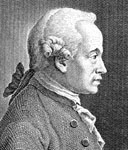Chapter 16. "Act in Accordance with Universal Law" by Immanuel Kant

Immanuel Kant, Antiquities Project
About the author…
Immanuel Kant (1724-1804) studied in Königsberg, East Prussia. Before he fully developed an interest in philosophy, he was fascinated with physics and astronomy—in fact, he anticipated William Herschel's discovery of Uranus by a few years. Kant's critical philosophy, one of the truly profound philosophies in all of Western Civilization, was constructed to forge empiricism and rationalism into a "critical" philosophy which sought to overcome the many pressing shortcomings of each. What we call objective reality, Kant argues, is subject to whatever conforms to the structures of our perception and thinking. Virtually every epistemological theory since Kant, directly or indirectly, refers to some aspect of The Critique of Pure Reason.
Kant was such an individual of regular habits that, reportedly, his neighbors in Köigsberg set their watches by the regularity of his afternoon walks.
About the work…
Immanuel Kant writes in his Fundamental Principles of the Metaphysic of Morals[1] that "I am never to act otherwise than so that I could also will that my maxim should become a universal law." This principle, termed the categorical imperative, is the foundation of the Kantian ethics. Kant believes that actions do not have moral worth because of their consequences. Actions proceeding from a good will, if done, for the sake of duty are unqualifiedly good.
Important Ideas from Fundamental Principles of the Metaphysic of Morals
According to Kant, what is the only good-in-itself? Why is this so? Is it a necessary condition for happiness?
Does Kant believe that you judge an action by its consequences? Might I have good will but do evil things through ignorance?
Does Kant believe reason is inimical to good choices? Explain his view of the relation between the good will and reason.
Why is it selfish for a prudent merchant not to overcharge a child? How does he distinguish between an action done for the sake of duty and an action done in accordance with duty?
Why according to Kant is there no moral worth in taking delight in helping others? Would it really be of higher moral worth to do one's duty grudgingly?
Explain how not keeping a promise cannot be done in accordance with the categorical imperative. How do you think Kant distinguishes between a maxim and a universal law?
Explain what it means to make a maxim a universal law? Can you think of an action which is morally correct that cannot be universalized?